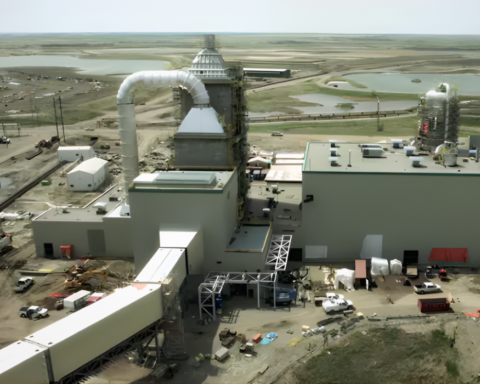Mobilising support for renewable energy begins with one reality: moral arguments are noble but ultimately insufficient. To achieve widespread and rapid change, it’s crucial to communicate renewable energy development as an economic strategy for individuals and businesses. We need to frame the discourse not in normative statements about “saving the environment,” but rather, in terms of economic returns, risks, and opportunities.
Reframing the environmental narrative
Let’s shift the environmental narrative from “stop producing, consuming, and depleting” to a more positive message that highlights production and consumption based on an abundance of renewable energy and material.
Relying on guilt to change business and individual behaviour can backfire. Businesses and individuals become disconnected from the long-term environmental vision when they are constantly shamed for driving cars, eating carbon-intensive foods, and living a certain way. We need to frame the transition differently – not as one of sacrifice and hardship, but as one of opportunity and shared benefits. This positive approach appeals to a larger segment of the population and inspires wide-scale change.
We already have the tools to make environmentally-beneficial initiatives, such as renewable energy development and green building design, more attractive than environmentally-damaging initiatives. Now we need to implement these tools and policies. How do we nudge businesses and individuals toward such sensibly-designed initiatives, investments, and decisions?
The economic imperative
Given dwindling non-renewable energy sources and a voracious appetite for energy, Canada will ultimately need to decouple non-renewable energy use from economic development. We simply cannot escape the hard logic of finite fossil fuel stocks or the laws of thermodynamics. Canada needs to use less risky and more abundant flows of renewable energy (RE) to drive its economy.
Non-renewable energy such as coal and oil is, by very definition, limited and risky for global economies. For instance, oil prices spiked by 35 percent in 2011:Q1 and reverberated throughout international industries. RE – especially in transportation, heating, and electricity generation – is less vulnerable to supply chain disruptions and global oil price volatility. China already recognises the economic value of RE. According to Bloomberg, China plans to invest $738 billion in RE in the next decade and now ranks first on Ernst & Young’s Renewable Energy Country Attractiveness Indices. Business leaders should take note: RE’s economic importance is growing quickly and should not be neglected.
A sensible economic strategy involves migrating to an integrated system underpinned by RE and energy efficiency. Such a strategy stimulates strong industrial development while also hedging against economic risks, especially in the likely event of carbon pricing. Last, RE’s employment benefits (340,000 jobs in the renewable energy sector in Germany) make it more politically amenable to politicians and their constituents.
Given the unavoidable expiration date of our current paradigm, RE is the only option for the middle and long term. Canada needs to plan for – and actively invest in – its manufacturing and human resources capacity for the future RE system. In doing so, Canada can strategically position itself as a global exporter of future-oriented services and equipment.
Renewable energy as a strategic business issue
It’s important to start with one principle in international business: sell or get sold to. Businesses that recognise emerging strategic issues will sell and thrive. For instance, businesses in the mid-1800s stopped selling whale oil not because of a sudden whale shortage; the demand shifted towards kerosene, and slow movers perished.
Forward-thinking businesses already recognise the risks and competitive advantages and disadvantages that exist in a carbon-constrained world. Multinational businesses (Google, GE, Berkshire), national businesses (Canadian Tire, MEC), and smaller start-ups are now investing heavily in RE initiatives. Others have incorporated RE into business operations, R&D, and procurement.
Strategic decisions extend well beyond today. The debate is about tomorrow’s returns, tomorrow’s market share, and tomorrow’s risks. Investing in RE is a proactive strategy for many businesses to hedge against escalating energy costs and create a competitive advantage. Let’s avoid the doom and gloom messaging, and focus on RE as a constructive and engaging solution for businesses.
Financing the renewable energy future
Innovative financing options have been designed for businesses and individuals interested in RE. Financing models such as community bonds, PACE, OBF, and green bonds can create accessible, stable, and attractive RE investments. More importantly, such investments provide everyday businesses and individuals with salient financial benefits while simultaneously contributing to constructive environmental and social objectives.
Such investment participation fuels a critical mass of funds for economically, socially, and environmentally-beneficial RE projects. Greater investment volume creates a virtuous cycle that further reduces financing costs in this sector and bolsters investor returns. This approach also builds awareness of RE and other environmental initiatives. Finally, attractive investments create another compelling justification for businesses and individuals to maintain their support for the broader environmental vision.
Nonetheless, RE investments continue to face some challenges. At the moment, investments are susceptible to policy uncertainty and political risk. The finance community needs to design more robust investment instruments that balance public interests, investor return expectations, and the stable cash-flow profiles of RE projects. Finally, RE projects need to be aggregated into portfolios to attract larger institutional investors and ‘patient capital.’ Continued progress in these areas will stimulate greater investment and a more widespread transition to a renewables system.
A vision of renewable energy and abundance
To achieve a widespread transition to RE, the moral imperative needs to be complemented with economic messaging. “Save the environment” is often too distant, contentious, or abstract; the joys of a winning lottery ticket, however, are salient and visceral. Sensibly-designed RE investments can benefit individuals, businesses, and the economy. Compared to moral arguments, monthly dividend cheques mobilise more support for climate change action and RE development.
Renewable energy is the only long-term viable energy source for our economies. It is not ‘alternative’ energy. The shift to a renewables system is unavoidable due to cold necessity, or strategic investing. We will live in a future fraught with sacrifice and hardship, or abundant with opportunities and shared benefits. So let’s start investing.







